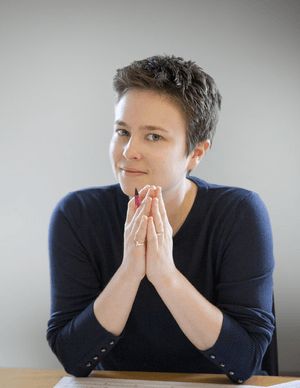Emily Howard facts for kids
Quick facts for kids
Emily Howard
|
|
|---|---|
 |
|
| Born | 23 February 1979 Liverpool
|
| Nationality | British |
| Alma mater | Lincoln College, Oxford; Royal Northern College of Music; University of Manchester |
| Occupation | Composer |
|
Notable work
|
Antisphere (2019); The Anvil (2019); Torus (2016); Magnetite (2007) |
Emily Howard is a British composer born in 1979. She is famous for creating music that connects with mathematical ideas and shapes. Her work often explores how music can be like different forms and processes found in maths.
Contents
Early Life and Education
Emily Howard was born in Liverpool, England. She first studied mathematics and computer science at Lincoln College, Oxford. After that, she decided to focus on music. She went on to study composition at the Royal Northern College of Music and the University of Manchester.
Her Musical Journey
Emily Howard's career as a composer began to shine in 2008. She was asked to write a piece for the Royal Liverpool Philharmonic Orchestra. This was to celebrate Liverpool being a European Capital of Culture. The music she created was called Magnetite. It was very well-received and helped her win an award from the Paul Hamlyn Foundation.
In 2010, Emily became the first UBS Composer in Residence with the London Symphony Orchestra (LSO). She wrote a piece called Solar for the LSO. Critics praised it for making a big impact with a compact sound. Her music was also featured in a special event in Vienna in 2011. Here, pieces like Magnetite and Solar were performed by famous orchestras.
Emily also enjoys playing with words in her music. She wrote an opera about a famous runner called Zátopek!. She also created short pieces called Ada sketches. These were shown at the Royal Opera House. In 2012, her work Mesmerism won a British Composer Award.
Music, Maths, and Science
Emily Howard's music often mixes art and science. Even though it's inspired by science, her music doesn't sound mechanical. It has its own special feel. She worked with a mathematician, Marcus du Sautoy, on a string quartet called Four Musical Proofs and a Conjecture. This piece was first played at a science festival in 2017.
In recent years, Emily has explored what she calls 'orchestral geometries'. These are large musical works that sound like shapes and processes. Her piece Torus, created for the BBC Proms in 2016, was called 'visionary'. It won an award in 2017. Another piece, Antisphere, was performed by the LSO in 2019.
Also in 2019, her work The Anvil: An Elegy for Peterloo was performed in Manchester. It featured an orchestra, choirs, and solo singers. People described Emily as one of Britain's most original musical voices. Her music was also a big part of the Barbican's 'Life Rewired' season. She helped create an evening of new music to honor Ada Lovelace, a famous mathematician.
Emily's first full-length opera, To See The Invisible, came out in 2018. It was based on a science fiction story. Critics noted that her music in the opera had a clear and confident style.
Teaching and Research
Besides composing, Emily Howard is also a researcher and teacher. In 2015, she was an Artist in Residence at the University of Liverpool. She worked in their Department of Mathematical Sciences.
In 2017, she helped start PRiSM. This is a center at the Royal Northern College of Music (RNCM) for studying music and science. Emily is the Director of PRiSM. She has also been a Professor of Composition at the RNCM since 2010.
In 2019, she was a visiting researcher at the University of Oxford. She was also made an honorary fellow of Lincoln College, Oxford. Emily lives in Manchester.
In 2023, Emily Howard was nominated for an Ivor Novello Award. Her piece Elliptics was nominated for Best Orchestral Composition.
Her Music Style
Emily Howard uses many different sounds in her music. She explores the extreme sounds that instruments and voices can make. The shape and story of a piece are very important to her. Her interest in music, maths, and computers shows up in some of her titles. Examples include Calculus of the Nervous System and Pi (a Pie?). She also loves chess, which is seen in her piece Chaos or Chess. Playing with words is another key part of her work.
Personal Life
Emily Howard's father used to play in the Liverpool Mozart Orchestra. She was also the British Junior Girls Chess Champion from 1990 to 1996.
Selected Works
Music for Orchestra
- Antisphere (2019)
- Torus (2016)
- Solar (2010)
- Magnetite (2007)
Music for Orchestra with Choir
- The Anvil (2019)
Operas and Vocal Music
- To See The Invisible (2018)
- Zátopek! (2012)
Music for Solo Voice
- But then, what are these numbers? (2019)
- Ada sketches (2011)
Music for Small Groups
- Four Musical Proofs and a Conjecture (2017)
Music for Solo Instruments
- Chaos or Chess (2016)
- Sky and Water (2005)
 | Jackie Robinson |
 | Jack Johnson |
 | Althea Gibson |
 | Arthur Ashe |
 | Muhammad Ali |

